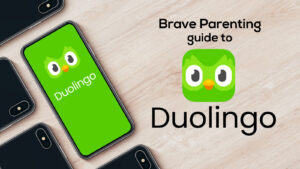Over the past ten years our culture has allowed for a seismic shift in acceptable and respectful behavior between people.
Phubbing, sharenting, exposing, roasting, and sexting are now everyday, household behaviors.
We’ve been swept off our feet from a tsunami of smartphones. Everyone now seems to be clinging to their devices for dear life. The debris and shrapnel left in the wake of this storm threaten our relationships, joy, peace, and intelligence. Yet, few are alert and aware. Many are hanging on to every notification, feature, and distraction as though these alone can save them.
And kids aren’t the only ones behaving this way. It can be seen equally in parents, and now grandparents as well.
Why is staring at our phones, instead of our loved ones, an acceptable and respectful behavior?
Take the dinner table, for example. What used to be a sacred place for families to share a meal together and spend time in relationship with one another is now often defiled with technology. Even meals among friends or couples on a date compete with the omnipresent smartphone.
Ding. We stop everything.
Ding. We look down.
Ding. We reply
Ding. Another like.
Ding. Another follower.
Ding. Someone must need me.
Ding. Someone retweeted.
Ding. What if this is important?
Silence. Where is my phone!!! I must have left it somewhere.
Silence. Is something wrong with my phone?
Silence. I’d better check all my feeds; make sure the world is still spinning on its axis for the 72 seconds I was away.
Silence. Everyone must hate me. Why isn’t anyone contacting me?
This pattern does something to our brain. In fact, researchers are learning more about the exact effects every day. One study, by the University of Texas, found that the mere presence of your smartphone can reduce brain power. The cognitive capacity, the brain’s ability to hold and process data, is lowered even when the smartphone is in a pocket or bag.
If the presence of our smartphone is draining our brain – which happens to be the only thing on this earth still more powerful than Google, Facebook, and Amazon – what is it doing to our relationships?
Recently, I went to a favorite Mexican restaurant with a friend. It was a Friday evening so the establishment was fairly crowded with a range of young and old couples, families, and groups of friends celebrating the weekend. At every table I looked, there was the smartphone.
An older couple, maybe in their late 60’s, continued their personal phone use despite their server arriving with their food.
Two young twenty-something girls sat on the same side of the table. They were fully engaged in their phones, but disengaged from one another.
A father walked in with this two young children and sits to wait for a table. He pulls out two tablets, both covered in a thick rubberized material fitted with handles: one pink and one blue. The father hands the tablets to his children, then withdraws his own phone from his pocket and begins to scroll. All of them silent during the interaction.
Can this be healthy for relationships?
What justification is there for outsourcing your active engagement with your children to a device?
Children often do not make the conscious decision to be on the screen. The parents choose to give it to them. Of course they won’t say no! The screen feels just as good to a child’s mind while playing games as it does to an adult’s mind while on social media or sports news sites.
What if there is more learned in simply being present than learned from online news?
What if our children desire to tell us about their day but we are caught up in Pintrest birthday party ideas?
What if we share stories with one another instead of sharing pictures on our Instagram story?
What if our Facebook friends wait instead of our children?
What is we listened to ramblings of childhood adventures with as much attention as we give YouTube videos?
What if our hands are free to hold and our eyes are free to meet instead of locked away in smartphone servitude?
What if our phones stayed silent in pockets or purses instead of beside our utensils?
We were created to be in relationships with people, not smartphones. Yes, our smartphones can keep us connected but never at the cost of disconnection from your spouse and children.
Instead of hanging on to every notification on our phone; let’s hang on to every interaction and conversation with our children.
Start with dinner. Then every meal of every day. No phones on the table.
No phones on the tables at home, in restaurants, in the work break room, at the coffee shop, or in the cafeteria.
If you are looking for a place to begin tempering screen use, it starts at the table.
If your family wants to begin looking up instead of down, it starts at the table.
If you want your children to engage, it starts with YOUR behavior at the table.
Implement device free dinners. Take the phones off the table.












